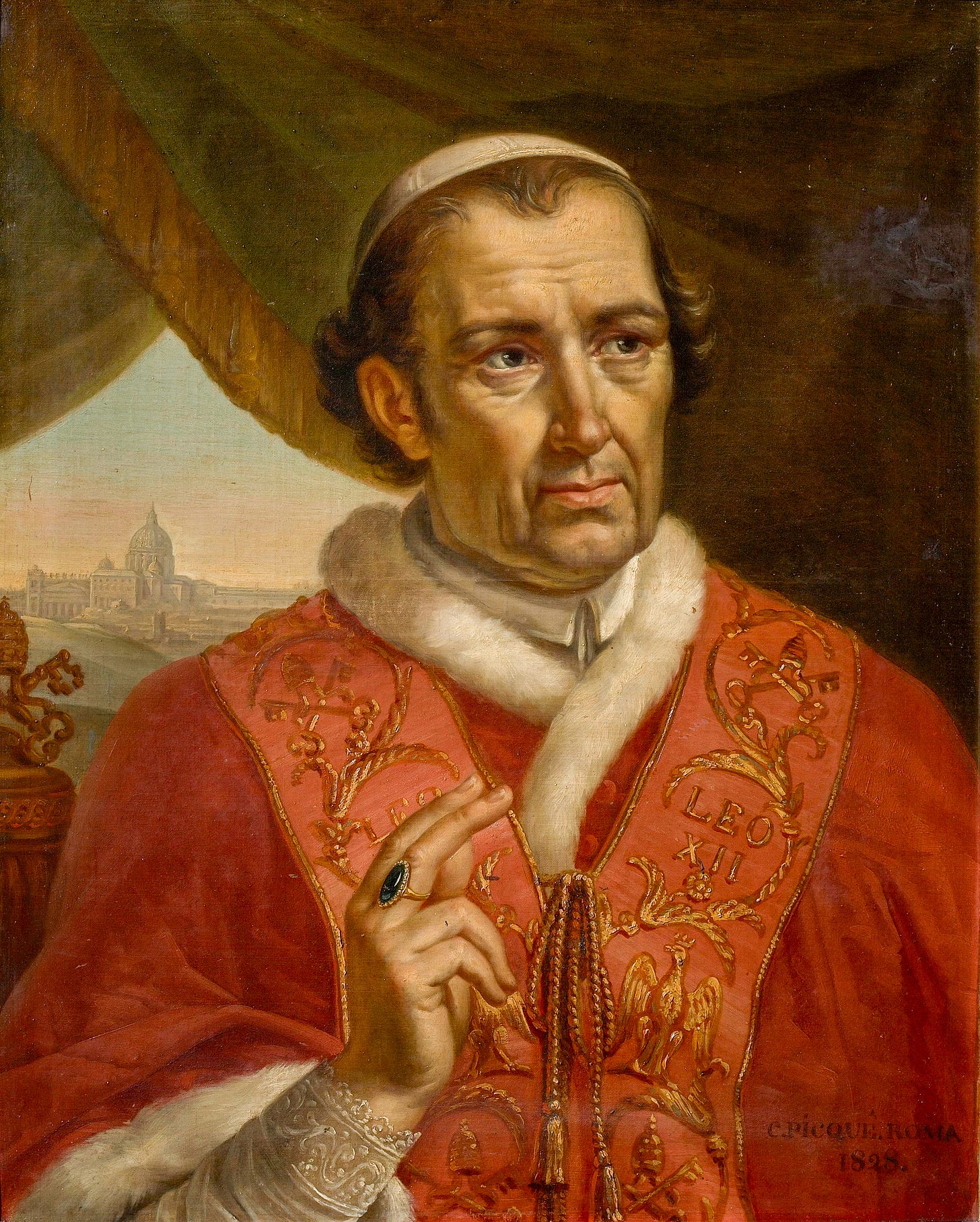Leo XII: The Restorer of Discipline
The Twelfth of the Leos | Pope Leo XII (1823–1829 AD)
“Stand ye in the ways, and see, and ask for the old paths, which is the good way, and walk ye in it: and you shall find refreshment for your souls.”
— Jeremiah 6:16, Douay-Rheims
The smoke of revolution still lingered in Europe when Leo XII ascended the throne of Peter. The Enlightenment had scorched faith, the French Revolution had slain altars, and Napoleon’s armies had trampled over the Papal States.
The Church emerged battered but unbroken, and into this fragile peace stepped a pope who sought not novelty, but order; not progress, but purity.
Pope Leo XII was not a reformer in the modern sense. He was a restorer, a man convinced that only by returning to the roots of Christian virtue could the Church heal the wounds of the age.
From Gubbio to the Papal Throne
Leo XII was born Annibale della Genga on August 22, 1760, in Gubbio, Italy, into a family of the minor nobility. He was educated in Rome and entered the papal diplomatic service, where he proved a skilled negotiator and a man of firm principle.
Under Pius VII, he served as nuncio to Cologne, navigating the difficult currents of post-Revolutionary Europe. His blunt honesty and pious rigor made him respected, but not universally loved. He was known for his ascetic lifestyle and stern demeanor, a man more monk than courtier.
He was elected pope on September 28, 1823, after the death of Pope Pius VII, at the age of sixty-three. Upon his election, he took the name Leo XII, invoking the lion not of power, but of vigilance.
The Spirit of Restoration
Leo XII’s papacy aimed to rebuild what revolution had undone. He saw in the liberal movements of his day not progress, but rebellion against God. His first priority was to restore moral discipline in both clergy and laity.
He reformed seminaries, insisting on stricter priestly formation. He called bishops to pastoral vigilance, demanded doctrinal orthodoxy, and fought the spread of indifferentism, the notion that all religions are equally pleasing to God.
In 1824, he issued the encyclical Ubi primum, urging bishops to uphold purity of faith and resist the spirit of modern unbelief.
He also reintroduced strict moral legislation in the Papal States, closing theaters on holy days, enforcing modesty, and even reviving certain public penances. To modern eyes, such rigor may seem severe, but Leo’s intent was paternal: to reawaken a sense of sin and grace in an age that had forgotten both.
A Heart for Mission and Mercy
Yet Leo XII was not merely a disciplinarian. Beneath his stern surface lay a deeply pastoral heart. He expanded missionary efforts, sending priests and religious to Asia, Africa, and the Americas. He supported the Congregation for the Propagation of the Faith, convinced that the Church’s renewal depended on her missionary zeal.
He also displayed great concern for the poor. During famines, he sold papal treasures to provide relief. His almsgiving was so generous that one observer wrote, “He gave away like a saint, though he governed like a king.”
A Watchman Against the Age
Leo XII understood his times as a battle between two civilizations: Christendom and the new secular order. To him, modern philosophy was not enlightenment but darkness pretending to be light.
He condemned secret societies, particularly Freemasonry, as engines of moral decay. He warned against “false freedom,” which separated liberty from truth.
In 1825, he proclaimed a Jubilee Year, calling all Christendom to repentance and renewal. Pilgrims poured into Rome by the tens of thousands. Though old and ill, Leo greeted them from his window with the words:
“Peace to you who come in penance, and woe to those who will not hear the call of mercy.”
Death of a Restorer
Pope Leo XII’s health declined sharply in his later years. He died on February 10, 1829, after six years of strenuous labor. He was buried in St. Peter’s Basilica, near the tomb of St. Leo the Great, a fitting resting place for one who fought to defend the faith in an age of doubt.
At his death, the Church was more disciplined, but Europe was already marching toward new revolutions. Still, Leo had planted seeds of renewal that would later blossom under Gregory XVI and Pius IX.
“Be watchful and strengthen the things that remain, which are ready to die.”
— Apocalypse 3:2, Douay-Rheims
Leo XII’s papacy was a vigil, a call to guard what was left of Christendom, to strengthen the remnants of faith before they faded into the noise of modernity.
The Lion of Vigilance
Pope Leo XII was not loved by the worldly. He was austere, uncompromising, and distrustful of new ideas. Yet in his severity burned the love of a father who refuses to see his children lost to the spirit of the age.
He was a lion not of thunder but of watchfulness, standing on the ramparts of a wounded Church, guarding her treasures of faith and virtue until the dawn.
The world around him called him reactionary. History remembers him as steadfast. Heaven, perhaps, remembers him as faithful.
He may not have restored Christendom, but he kept the flame alive.


